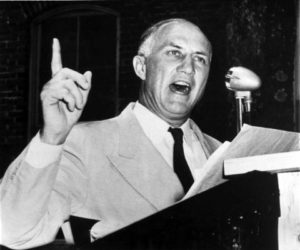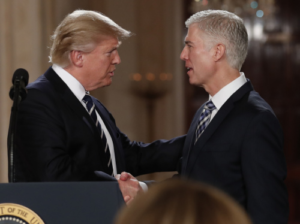Donald J. Trump keeps ratcheting up his open combat with the federal judicial system.
The president wants to break up the 9th U.S. Circuit Court of Appeals because — doggone it, anyway! — the judges keep issuing rulings with which he disagrees.
Poor guy. That’s how it goes sometimes, Mr. President.
The 9th Circuit has ruled against the president’s ban on refugees seeking entry into this country from majority-Muslim countries. That just won’t stand in Trump’s world. So his solution is to dismember the court, which is based in San Francisco and is considered to be arguably the most liberal appellate court in the federal judicial network.
He said lawyers shop for friendly judicial venues and the president believes the 9th Circuit is a favorite forum to hear cases pitting the federal government against anyone else.
Give me a break.
Conservative courts have ruled against liberal presidents. Indeed, liberal courts have ruled against conservative presidents as well. Have presidents of either stripe been so thin-skinned that they’ve sought to break up an appellate court? Not until this one took office.
Leave the court alone, Mr. President.
A better option for the president would be to craft laws that can withstand judicial challenge. Federal judges in Hawaii, Washington state and Maryland all have found sufficient fault with the Trump administration’s effort to ban refugees to rule against them. Appellate judges have upheld the lower court rulings.
In a strange way this kind of reminds me of when President Franklin Roosevelt sought to tinker with the federal judiciary by “packing” the U.S. Supreme Court with justices more to his liking; he sought to expand the number of justices on the nation’s highest court. He didn’t succeed — thank goodness.
To be sure, Trump isn’t the only recent president to bully the federal judiciary. Barack Obama called out the Supreme Court while delivering a State of the Union speech in 2010 over its Citizens United ruling that allowed unlimited political contributions by corporations. The president was wrong to do so — in that venue — with the justices sitting directly in front of him.
The nation’s founders sought to establish an independent federal judiciary that ostensibly should be immune from political pressure. The president is seeking to bully the court system through a number of methods: He calls out judges individually and criticizes the courts’ decisions openly and with extreme harshness.
The 9th U.S. Circuit Court of Appeals needs to remain intact and the president needs to live with the consequences of how it interprets the U.S. Constitution.






